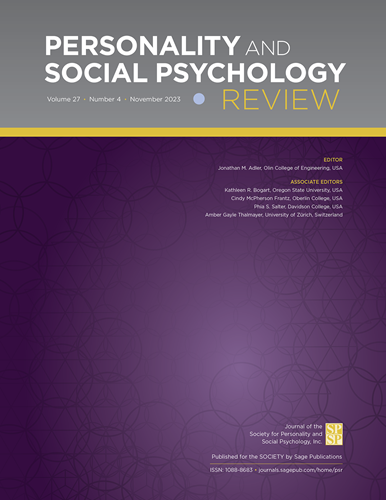荣誉的昂贵道德理论:一个进化的、文化情境认知的视角。
IF 10.4
1区 心理学
Q1 PSYCHOLOGY, SOCIAL
引用次数: 0
摘要
荣誉是普遍可理解的,在频率、慢性和强度上因地区而异,在每个时间和地点看起来都不同。我们使用文化情境认知理论(CSCT),一种整合文化情境社会认知的理论来理解其中的原因。人类文化解决了反复出现的问题;它们出现的频率、时间和强度取决于它们的生态位;解决这些问题的做法因时间和地点而异。通过在CSCT的三个层次上分别建立两个轴(道德-不道德和成本-成本-无),我们在CSCT中阐述了荣誉的代价道德理论(CMTH),以区分荣誉与相关构念。在我们的表述中,荣誉是代价高昂的道德,解决了通过代价高昂的诚信信号来调节关系的反复出现的问题(人类普遍存在)。身处严酷生态环境的社会需要付出更多的代价,才能找到诚实的信号,并关注道德的特定相关方面(生态位相关)。荣誉规定了如何在世界上成为一个人(特定于时间和地点)。人们对荣誉、荣誉是什么、谁拥有荣誉都有日常的理解,但是它们的含义很难用语言表达出来,而为荣誉服务的行为在不同的时代和社会中是不同的。我们建立在文化情境认知理论的基础上,该理论解释了荣誉在人类文化中的重要性,它在社会中的可变中心地位,以及社会中与之相关的不同具体规范和实践,假设荣誉需要道德行为,一种对行为者来说代价高昂的注意义务。我们运用荣誉作为代价高昂的道德理论,将荣誉与相关概念区分开来,希望我们的框架能够帮助人们更好地理解和沟通,跨越时间和地点的鸿沟,即使在对谁以及以何种方式扩展注意义务存在分歧的情况下也是如此。本文章由计算机程序翻译,如有差异,请以英文原文为准。
Costly Morality Theory of Honor: An Evolutionary, Culture-as-Situated-Cognition Perspective.
Honor is universally comprehensible, varies regionally in frequency, chronicity, and intensity, and looks different at each time and place. We use culture-as-situated-cognition theory (CSCT), an integrating situated social cognition account of culture, to understand why. Human culture addresses recurrent problems; how frequently, chronically, and intensely each comes to mind depends on their ecological niche; the practices addressing them vary in time and place. We articulate the costly morality theory of honor (CMTH) within CSCT to distinguish honor from related constructs by theorizing two axes (morality-immorality and costly-cost-free) at each of CSCT's three levels. In our formulation, honor is costly morality, resolving the recurrent problem of regulating relationships through costly signals of trustworthiness (human-universal). Societies embedded in harsher ecological niches require more cost to find a signal to be honest and focus on particular relational aspects of morality (niche-linked). Honor specifies how to be a person in the world (time-and-place-specific).Public AbstractPeople have an everyday understanding of honor, what it is, and who has it, but what they mean can be hard to put into words, and what actions in service of honor look like vary across times and societies. We build on culture-as-situated-cognition theory, which accounts for honor's importance in human culture, its variable centrality across societies, and differing specific norms and practices connected to it within societies, to posit that honor entails moral action, a duty of care, that is costly to the actor. We apply our honor-as-costly-morality theory to distinguish honor from related ideas in the hope that our framework helps people better understand and communicate across time-and-place divides, even while disagreeing on to whom and in what way the duty of care extends.
求助全文
通过发布文献求助,成功后即可免费获取论文全文。
去求助
来源期刊

Personality and Social Psychology Review
PSYCHOLOGY, SOCIAL-
CiteScore
19.00
自引率
1.90%
发文量
20
期刊介绍:
Title: Personality and Social Psychology Review (PSPR)
Journal Overview:
Official journal of SPSP, the Society for Personality and Social Psychology, Inc.
Premiere outlet for original theoretical papers and conceptual review articles in all areas of personality and social psychology
Features stimulating conceptual pieces identifying new research directions and comprehensive review papers providing integrative frameworks for existing theory and research programs
Topics Covered:
Attitudes and Social Cognition: Examines the inner workings of the human mind in understanding, evaluating, and responding to the social environment
Interpersonal and Group Processes: Explores patterns of interaction and interdependence characterizing everyday human functioning
Intergroup Relations: Investigates determinants of prejudice, conflict, cooperation, and harmonious relationships between social groups
Personality and Individual Differences: Focuses on causes, assessment, structures, and processes giving rise to human variation
Biological and Cultural Influences: Studies the biological and cultural mediation of social psychological and personality processes
 求助内容:
求助内容: 应助结果提醒方式:
应助结果提醒方式:


